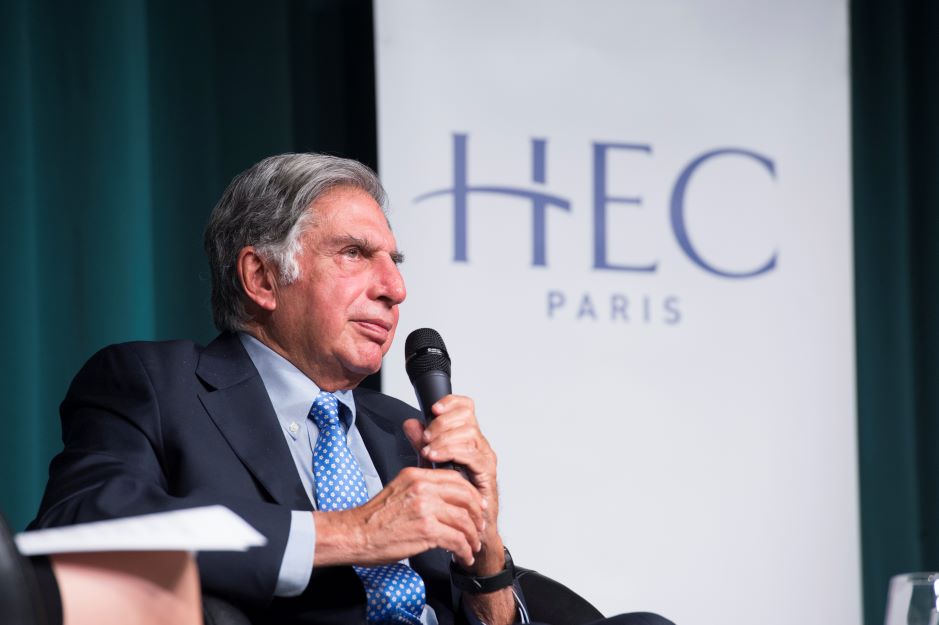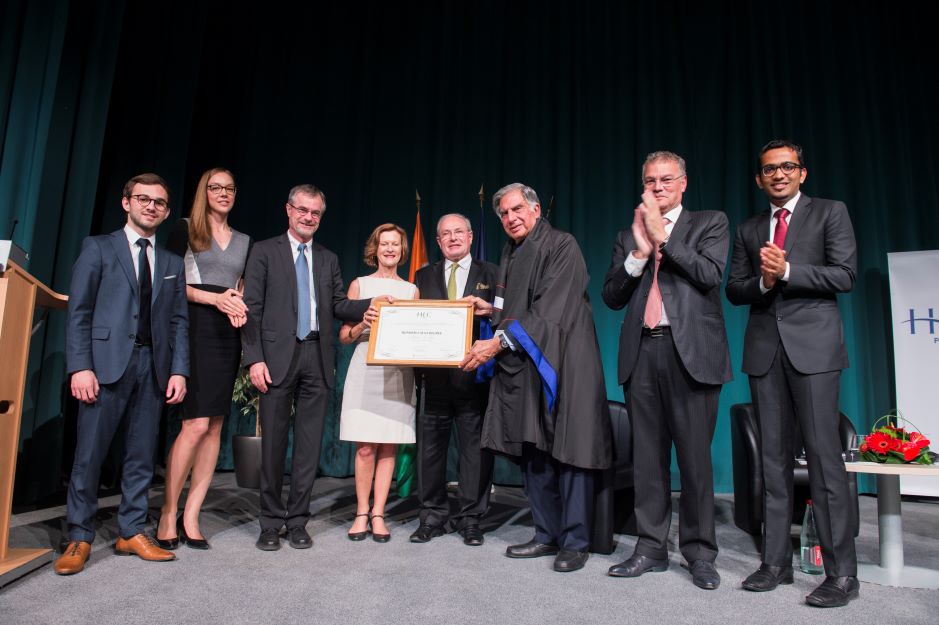Ratan Tata’s Legacy: Visionary and Responsible Leadership in a Globalized World Remembered at HEC Paris
Ratan Tata’s Legacy: Visionary and Responsible Leadership in a Globalized World Remembered at HEC ParisRatan Tata, the former chairman of Tata Group, passed away on October 9, 2024. On April 23, 2015, we had the immense honor of welcoming him to the HEC campus to present him with an Honoris Causa degree from the HEC faculty. Known for his transformational and ethical leadership with a strong sense of social responsibility is one of India's most respected business leaders. During his conference at HEC, he offered invaluable lessons to students - lessons that resonate today as tributes pour in from around the world.

A Visionary Leadership
Ratan N. Tata's career as head of the Tata Group, India's largest multinational conglomerate, is that of an icon of industry who has understood globalization like no other. Serving as Chairman for more than two decades, Tata transformed the group into a global powerhouse, with over 500,000 employees and operations in more than 56 countries.
His strategic vision, particularly in spearheading international acquisitions such as Jaguar Land Rover, Tetley Tea, and Corus Steel, elevated the Tata Group’s global standing. Tata championed the development of affordable products tailored to emerging markets. The Tata Nano, launched in 2009, is a prime example of this and a symbol of Tata’s commitment to innovation. Marketed as the world’s cheapest car, it aimed to make car ownership accessible to millions in India.
Since the announcement of his death, eminent personalities have expressed their condolences and reflected on Tata's impact. Prime Minister Narendra Modi described him as a “visionary business leader” whose contribution extended beyond corporate boards to benefit society. Google CEO Sundar Pichai highlighted Tata's role in mentoring modern business leadership in India, emphasizing his legacy in both business and philanthropy.
A Dedication to Philanthropy and Social Responsibility
A distinguishing feature of the Tata Group under Ratan Tata has been its strong commitment to philanthropy and corporate social responsibility (CSR). Tata directed a substantial portion of the group's profits towards philanthropic efforts through Tata Trusts, focusing on healthcare, education, and rural development across India. Ratan Tata himself has been deeply involved in promoting social causes, reinforcing the Tata Group's long-standing emphasis on ethical business practices and giving back to society.
At the 2015 award ceremony, HEC Paris Dean Bernard Ramanantsoa praised Tata’s humility, entrepreneurial spirit, and the “Tata way” of doing business. He noted that beyond the business success, Tata’s leadership reflects values deeply shared by HEC Paris: respect for human dignity, social responsibility, and a commitment to global impact.
The Loneliness of Leadership
During the event, Tata shared personal anecdotes about his leadership journey and the challenges he faced. One of the defining moments of his career was the launch of the Tata Nano in 2008, to provide affordable mobility for India’s masses. While the project encountered significant political and logistical hurdles, including a factory relocation from West Bengal to Gujarat, Tata’s resilience shone through. Despite the setbacks, he maintained that ethical decision-making and long-term vision should guide every action.
Tata’s reflections also highlighted the loneliness often experienced by leaders, particularly in challenging times. “It’s almost an occupational hazard,” he remarked, describing how leaders frequently face difficult decisions in isolation. However, his emphasis on humility, ethical leadership, and fairness stood out as core tenets that helped him navigate complex business landscapes.
A Legacy of Ethical Business
One of the key aspects that sets Ratan N. Tata apart is his unwavering commitment to ethics and fairness. In his address, Tata shared his belief that business success should never come at the cost of compromising on principles. This belief was evident in his leadership of the Tata Group, which grew from a $5 billion company to a $100 billion enterprise without succumbing to corrupt practices, even in environments where such challenges are prevalent. Tata’s example offers a powerful lesson to future business leaders: long-term success comes from doing what is right, not what is expedient.
“Leadership is not about being autocratic; it’s about being humble and communicative,” Tata emphasized, encouraging students to focus on authenticity and humility in their leadership styles.

A Legacy of Values
Ratan N. Tata’s visit to HEC Paris and the honor bestowed upon him serve as a reminder of the values that underpin true leadership. His legacy goes far beyond financial success; it is a testament to the power of ethics, humility, and a long-term vision in creating sustainable impact. For the students and faculty of HEC Paris, and for aspiring business leaders around the world, Tata’s story offers both inspiration and a roadmap for the future.
As Tata himself noted, “Apart from values and ethics, which I have tried to live by, the legacy I would like to leave behind is a very simple one: that I always stood up for what I considered to be the right thing, and I tried to be as fair and equitable as I could be.”
***
HEC Paris and India
Over the years, HEC Paris has developed close relationships with leading Indian higher education institutions, including IIM Ahmedabad (IIM-Ah), IIM Bangalore (IIMB), IIM Calcutta (IIMC), Indian School of Business (ISB), and Ashoka University.
Today, three HEC Alumni chapters are active in India, located in New Delhi, Mumbai, and Bangalore, further strengthening the bonds between HEC Paris and the Indian business community.